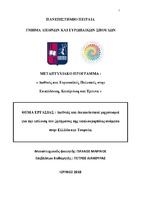| dc.contributor.advisor | Λιάκουρας, Πέτρος | |
| dc.contributor.author | Μαρίνος, Παύλος | |
| dc.date.accessioned | 2018-11-21T06:59:05Z | |
| dc.date.available | 2018-11-21T06:59:05Z | |
| dc.date.issued | 2018-06 | |
| dc.identifier.uri | https://dione.lib.unipi.gr/xmlui/handle/unipi/11597 | |
| dc.description.abstract | Στις σχέσεις Ελλάδας Τουρκίας , τα κύρια ζητήματα που απασχολούν τις δύο χώρες πολιτικά αλλά και οικονομικά σχετίζονται με τη Κύπρο ή το Αιγαίο. Ειδικότερα το ζήτημα της υφαλοκρηπίδας, έχει απασχολήσει έντονα τα δύο κράτη ειδικά μετά τη πτώση της Σοβιετικής Ένωσης και την ίδρυση της Ευρωπαϊκής Ένωσης. Τα αίτια των διαφορών αυτών πηγάζουν από αντικρουόμενα εθνικά συμφέροντα των δύο χωρών. Η Ελλάδα είναι αποφασισμένη να επιλύσει τα ζητήματα αυτά μέσω των αναγνωρισμένων αρχών του διεθνούς δικαίου, αλλά εμποδίζεται από την άρνηση της Τουρκίας να συνεργαστεί στο πλαίσιο των παραμέτρων των διεθνών οργανισμών όπως τα Ηνωμένα Έθνη και το Διεθνές Δικαστήριο Δικαιοσύνης. Ως προς την επίλυση του ζητήματος, η επικρατέστερη οδός φαίνεται να είναι το Διεθνές Δικαστήριο ή η Διαιτησία.
Επιπλέον, η θέση της Τουρκίας είναι ισχυρότερη όσον αφορά τα νησιά του Ανατολικού Αιγαίου, ιδιαίτερα εκείνα που βρίσκονται κοντά στις ακτές της. Μερικά από τα νησιά του Δυτικού Αιγαίου βρίσκονται πολύ κοντά στην ηπειρωτική ακτή της Ελλάδας ενώ στο ανατολικό μισό δεν έχουν τους ίδιους γεωγραφικούς δεσμούς με την ελληνική ηπειρωτική χώρα. Ένας πιθανός συμβιβασμός μπορεί να είναι η αποδοχή μιας χωρικής θάλασσας μήκους 12 ναυτικών μιλίων από τις ακτές της Ελλάδας, αλλά όχι από τα νησιά της. Άλλο μπορεί να είναι να επιτρέψει τουλάχιστον σε κάποια από τα νησιά της Ελλάδας στο δυτικό Αιγαίο, να δημιουργήσουν ζώνες 12 ναυτικών μιλίων, συνεχίζοντας παράλληλα να συμπεραίνει ότι τα ανατολικά ελληνικά νησιά πρέπει να περιορίζουν τις εδαφικές θάλασσές τους σε 6 ναυτικά μίλια. | el |
| dc.format.extent | 94 | el |
| dc.language.iso | el | el |
| dc.publisher | Πανεπιστήμιο Πειραιώς | el |
| dc.title | Διεθνείς και δικαιοδοτικοί μηχανισμοί για την επίλυση του ζητήματος της υφαλοκρηπίδας ανάμεσα στην Ελλάδα και Τουρκία | el |
| dc.type | Master Thesis | el |
| dc.contributor.department | Σχολή Οικονομικών, Επιχειρηματικών και Διεθνών Σπουδών. Τμήμα Διεθνών και Ευρωπαϊκών Σπουδών | el |
| dc.description.abstractEN | In the relations between Greece and Turkey, the main issues that concern the two countries are politically and economically related to Cyprus or the Aegean. The issue of the continental shelf has been highly concerning by the two states, especially after the fall of the Soviet Union and the establishment of the European Union. The causes of these differences arise from conflicting national interests of the two countries. Greece is determined to resolve these issues through the recognized principles of international law but is hampered by Turkey's refusal to cooperate within the framework of the parameters of international organizations such as the United Nations and the International Court of Justice. As far as a resolution is concerned, the most prevalent way seems to be the International Court or Arbitration.
Moreover, Turkey's position is stronger regarding the Eastern Aegean islands, especially those near its shores. Some of the Western Aegean islands are very close to the mainland coast of Greece while in the eastern half they do not have the same geographical links with the Greek mainland. A possible compromise may be the acceptance of a 12 nautical mile seas from the coasts of Greece but not from its islands. Another may be to allow at least some of the islands of Greece in the western Aegean to create 12 nautical mile zones, while continuing to conclude that the eastern Greek islands must limit their territorial seas to 6 nautical miles. | el |
| dc.contributor.master | Διεθνείς κι Ευρωπαϊκές Πολιτικές στην Εκπαίδευση, Κατάρτιση και Έρευνα | el |
| dc.subject.keyword | Υφαλοκρηπίδα | el |
| dc.subject.keyword | Ελληνοτουρκικές σχέσεις | el |
| dc.subject.keyword | Αιγαίο | el |
| dc.subject.keyword | Διεθνές Δικαστήριο | el |
| dc.subject.keyword | Διαιτησία | el |
| dc.date.defense | 2018-07-09 | |


